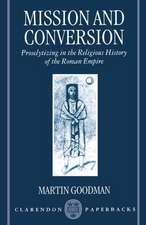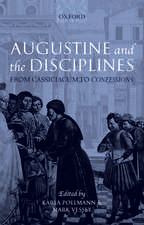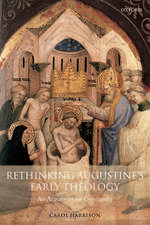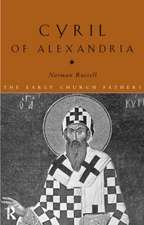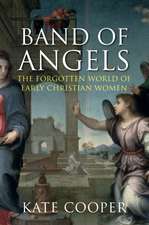The Prologues on Easter of Theophilus of Alexandria and [Cyril]: Oxford Early Christian Texts
Editat de Alden A. Mosshammeren Limba Engleză Hardback – 10 aug 2017
Din seria Oxford Early Christian Texts
- 34%
 Preț: 1333.51 lei
Preț: 1333.51 lei - 30%
 Preț: 906.13 lei
Preț: 906.13 lei - 34%
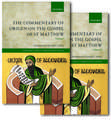 Preț: 1566.60 lei
Preț: 1566.60 lei - 34%
 Preț: 1010.88 lei
Preț: 1010.88 lei - 29%
 Preț: 836.73 lei
Preț: 836.73 lei - 34%
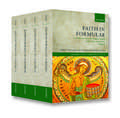 Preț: 3925.15 lei
Preț: 3925.15 lei - 31%
 Preț: 954.63 lei
Preț: 954.63 lei - 34%
 Preț: 872.15 lei
Preț: 872.15 lei - 34%
 Preț: 1077.58 lei
Preț: 1077.58 lei - 34%
 Preț: 1285.12 lei
Preț: 1285.12 lei - 34%
 Preț: 962.39 lei
Preț: 962.39 lei - 34%
 Preț: 1254.89 lei
Preț: 1254.89 lei - 34%
 Preț: 959.09 lei
Preț: 959.09 lei - 34%
 Preț: 990.64 lei
Preț: 990.64 lei - 34%
 Preț: 1340.93 lei
Preț: 1340.93 lei - 34%
 Preț: 1167.93 lei
Preț: 1167.93 lei - 30%
 Preț: 1098.42 lei
Preț: 1098.42 lei - 34%
 Preț: 1039.92 lei
Preț: 1039.92 lei - 34%
 Preț: 933.73 lei
Preț: 933.73 lei - 34%
 Preț: 934.13 lei
Preț: 934.13 lei - 25%
 Preț: 412.94 lei
Preț: 412.94 lei - 34%
 Preț: 1528.40 lei
Preț: 1528.40 lei - 34%
 Preț: 623.35 lei
Preț: 623.35 lei - 23%
 Preț: 332.00 lei
Preț: 332.00 lei - 31%
 Preț: 978.68 lei
Preț: 978.68 lei - 30%
 Preț: 1237.35 lei
Preț: 1237.35 lei - 34%
 Preț: 916.79 lei
Preț: 916.79 lei - 33%
 Preț: 574.84 lei
Preț: 574.84 lei - 34%
 Preț: 562.89 lei
Preț: 562.89 lei - 16%
 Preț: 300.43 lei
Preț: 300.43 lei - 29%
 Preț: 833.12 lei
Preț: 833.12 lei - 30%
 Preț: 889.27 lei
Preț: 889.27 lei - 29%
 Preț: 912.66 lei
Preț: 912.66 lei
Preț: 772.47 lei
Preț vechi: 1173.38 lei
-34% Nou
Puncte Express: 1159
Preț estimativ în valută:
147.81€ • 154.33$ • 122.33£
147.81€ • 154.33$ • 122.33£
Carte tipărită la comandă
Livrare economică 25-31 martie
Preluare comenzi: 021 569.72.76
Specificații
ISBN-13: 9780198792574
ISBN-10: 0198792573
Pagini: 208
Dimensiuni: 173 x 240 x 18 mm
Greutate: 0.45 kg
Editura: OUP OXFORD
Colecția OUP Oxford
Seria Oxford Early Christian Texts
Locul publicării:Oxford, United Kingdom
ISBN-10: 0198792573
Pagini: 208
Dimensiuni: 173 x 240 x 18 mm
Greutate: 0.45 kg
Editura: OUP OXFORD
Colecția OUP Oxford
Seria Oxford Early Christian Texts
Locul publicării:Oxford, United Kingdom
Recenzii
The monograph is well balanced and contains lots of knowledge and information in its 194 pages... The commentaries by Mosshammer provide an excellent interpretative tool and, thanks to his translations, the reader can now undertake the difficult task of reading (and understanding) these materials more securely.
Mosshammer shows familiarity with all the relevant older and more recent literature and nowhere shrinks away from highly technical and much debated calendrical issues, such as the correspondence between Roman and Egyptian calendars for determining the dates of the vernal equinox. This makes this book and other publications by Mosshammer indispensable tools for every scholar interested in the calculation of the Easter date in early Christianity, more specifically the development of the Alexandrian Easter cycles.
Mosshammer has rendered an invaluable service to members of both the scholarly and the faith communities who wish to understand how such events could take place. His book will be a prize possession in every research library.
Mosshammer shows familiarity with all the relevant older and more recent literature and nowhere shrinks away from highly technical and much debated calendrical issues, such as the correspondence between Roman and Egyptian calendars for determining the dates of the vernal equinox. This makes this book and other publications by Mosshammer indispensable tools for every scholar interested in the calculation of the Easter date in early Christianity, more specifically the development of the Alexandrian Easter cycles.
Mosshammer has rendered an invaluable service to members of both the scholarly and the faith communities who wish to understand how such events could take place. His book will be a prize possession in every research library.
Notă biografică
Alden Mosshammer is Emeritus Professor of History at the University of California, San Diego. He has also taught at The Mercersburg Academy, Kenyon College, and Swarthmore College. He earned a BA in Classics and Philosophy at Amherst College and a Phd in Classics at Brown University. Professor Mosshammer has taught all periods of the ancient history of the Mediterranean world, as well as courses in Greek, Latin, Early Christianity, and comparative religion. He is especially well known for his work on Chronicles, Chronology, and Computus. His previous publications include The Easter Computus and the Origins of the Christian Era (OUP, 2008).
![The Prologues on Easter of Theophilus of Alexandria and [Cyril] de Alden A. Mosshammer](https://i2.books-express.ro/be/9780198792574/the-prologues-on-easter-of-theophilus-of-alexandria-and-cyril.jpg)

